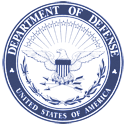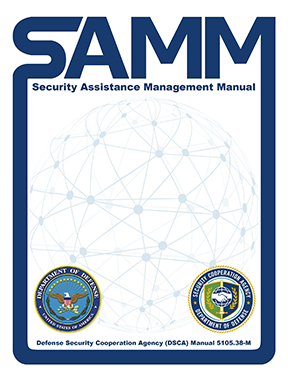Incorporated
Policy changes from this SAMM E-Change memo have been incorporated into the SAMM.

DEFENSE SECURITY COOPERATION AGENCY
2800 DEFENSE PENTAGON
WASHINGTON, D.C. 20301-2800
11/14/2025
MEMORANDUM FOR :
DEPUTY UNDER SECRETARY OF THE AIR FORCE FOR INTERNATIONAL AFFAIRS
DEPUTY ASSISTANT SECRETARY OF THE ARMY FOR DEFENSE EXPORTS AND COOPERATION
DEPUTY ASSISTANT SECRETARY OF THE NAVY FOR INTERNATIONAL PROGRAMS
DIRECTOR, DEFENSE CONTRACT MANAGEMENT AGENCY
DIRECTOR, DEFENSE INFORMATION SYSTEMS AGENCY
DIRECTOR, DEFENSE LOGISTICS AGENCY
DIRECTOR, DEFENSE THREAT REDUCTION AGENCY
DIRECTOR, MISSILE DEFENSE AGENCY
DIRECTOR, NATIONAL GEOSPATIAL-INTELLIGENCE AGENCY
DIRECTOR, SECURITY COOPERATION ACCOUNTING DIRECTORATE, DEFENSE FINANCE AND ACCOUNTING SERVICE, INDIANAPOLIS OPERATIONS
DIRECTOR OF CYBERSECURITY DIRECTORATE AND DEPUTY NATIONAL MANAGER FOR NATIONAL SECURITY SYSTEMS, NATIONAL SECURITY AGENCY
SUBJECT :
Defense Security Cooperation Agency Policy Memorandum 25-95 International Competition for Defense Articles and/or Services Guidance Updates (SAMM E-Change 789)
This memorandum updates the Security Assistance Management Manual (SAMM) to update DSCA International Competitions for defense articles and/or services guidance. The policy in the attachment is incorporated into the DSCA SAMM at https://samm.dsca.mil.
The SAMM and this e-change are accessible at https://samm.dsca.mil. If you have questions about this memorandum, please contact DSCA (Office of International Operations, Weapons Directorate (IOPS/WPN)) at dsca.ncr.iops.list.wpns-all-members@mail.mil. Please reference the DSCA policy number and memorandum subject in your inquiry. For general questions about the SAMM, please contact DSCA (Office of Strategy, Plans, and Policy, Execution Policy and Analysis Directorate (SPP/EPA)) at dsca.ncr.spp.mbx.epa@mail.mil.
Hussam Bader
Acting Assistant Director
Strategy, Plans, and Policy
ATTACHMENT :
- Attachment 1: SAMM E-Change 789 - Chapter 4 Addition
- Attachment 2: DSCA International Competitions for Defense Articles and/or Services Reference Guide
Attachment 1: Security Assistance Management Manual (SAMM), E-Change 789
Update Section C4.3.1.
Current:
C4.3.1. International Weapons Competitions. Foreign nations often compete weapon system procurements. The foreign government's defense or economic ministry solicits bids or proposals from defense industries in the international market. Depending on the nation's acquisition process, the solicitation may be a formal request for information, a tender or proposal, an invitation to bid, or a similar document that states the review criteria for proposal submissions. Given the size of the U.S. industrial base, the U.S. response may consist of more than one offering. In the international competition, the foreign nation evaluates proposals submitted by both the U.S. and non-U.S. competitors against the solicitation criteria.
C4.3.1.1. Foreign Solicitation. In an international competition, the foreign nation releases its solicitation in the international market. When submitted through appropriate channels (See Section C5.1.3.) the solicitation is an Letter of Request (LOR) and initiates USG processes (e.g., National Disclosure Policy (NDP)-1, technology transfer, and other reviews) to determine whether it is in the U.S. best interest to participate in the competition. The U.S. response in an international competition may include FMS, Direct Commercial Sales (DCS), international cooperative agreement, or a combination of these programs. See Section C5.2. for more information on LOR responses. Most foreign solicitations are released to international defense industries rather than to Governments; however, the FMS process should not be excluded from the response solely on the basis of how the foreign solicitation was released or conditioned.
C4.3.1.2. Lead Agency for Advocacy. DSCA is the DoD focal point for policy regarding U.S. participation in international competitions. The Military Departments (MILDEPs) and defense contractor team develop the proposal, which is presented by the appropriate MILDEP as the representative of the USG. Table C4.T4. identifies the lead agency and advocacy for the USG responses.
Table C4.T4. Lead Agency and Advocacy in International Competitions
Number of United States Responses
Number of Services Involved
Lead Department of Defense Agency
United States Government Advocacy
One
One
MILDEP responsible for the weapon system or technology offered
The one U.S. system offered is articulated as the formal U.S. position.
More than one
One
MILDEP responsible for the weapon systems or technologies offered
USG personnel may not favor the merits of one U.S. proposal over another. U.S. advocacy must be generic - the U.S. proposals are combat proven, interoperable with many nations, technologically superior, worldwide supportable, etc. This neutral stance extends to USG presence in meetings with foreign officials. If USG personnel are present for one U.S. contractor presentation, every effort must be made to be present for all briefings on other U.S. offerings. Only when one U.S. MILDEP and/or contractor team remains in the competition can the United States advocate one U.S. offering. This occurs if all other MILDEP and/or contractor teams self-eliminate or the foreign nation formally states these proposals are no longer under consideration.
More than one
DSCA
C4.3.1.3. Responsibilities of the Department of Defense Lead Managing the United States Government Response. The DoD lead facilitates the USG's deliberative processes in order to develop the policy decisions that affect the proposals as early as possible. The DoD lead obtains the views of the key USG stakeholders: Department of State (State), the Department of Commerce (DOC), Office of the Under Secretary of Defense for Policy (OUSD(P)), Office of the Under Secretary of Defense for Acquisition and Sustainment (OUSD(A&S)), Defense Technology Security Administration (DTSA), DSCA, and the MILDEPs. The DoD lead ensures MILDEP and/or contractor teams submit proposals that are consistent with internal U.S. decisions, are as responsive as possible to the requirements of the foreign solicitation and meet the solicitation's schedule. In cases of multiple U.S offerings, the DoD lead must facilitate all U.S. proposals impartially so that there is no perception that one offering is preferred over another and there is no biased interpretation of policy. The DoD lead must bring together all competing MILDEP and/or contractor teams to highlight issues, perform joint problem solving, establish plans and agreements, ensure that the U.S. entrants are being held to the same standards, address cross-cutting issues, and coordinate responses with the foreign purchaser.
Revised:
C4.3.1. International Weapons Competitions for Defense Articles and/or Services. Foreign governments and international organizations (partners) often compete weapon system procurements. These are referred to as international competitions for defense articles and/or services. The partner solicits bids or proposals from defense industries in the international market. Depending on the partner's acquisition process, the solicitation may be a formal request for information, a tender or proposal, an invitation to bid, or a similar document that states the review criteria for proposal submissions. Given the size of the U.S. industrial base, the U.S. response may consist of more than one offering. In the international competition, the partner evaluates proposals submitted by both the U.S. and non-U.S. competitors against the solicitation criteria.
C4.3.1.1. Foreign Solicitation. In an international competition, the partner releases its solicitation in the international market. When submitted through appropriate channels (See Section C5.1.3.) the solicitation is a Letter of Request (LOR) and initiates USG processes (e.g., National Disclosure Policy (NDP)-1, technology transfer, and other reviews) to determine whether it is in the U.S. best interest to participate in the international competition. The U.S. response in an international competition may include FMS, Direct Commercial Sales (DCS), international cooperative agreement, or a combination of these programs. See Section C5.2. for more information on LOR responses. Most foreign solicitations are released to international defense industries rather than to Governments; however, the FMS process should not be excluded from the response solely on the basis of how the foreign solicitation was released or conditioned.
C4.3.1.2. Lead Agency for Advocacy. DSCA is the DoD focal point for policy regarding U.S. participation in international competitions. The Military Departments (MILDEPs) and defense contractor team develop the proposal, which is presented by the appropriate MILDEP as the representative of the USG. Table C4.T4. identifies the lead agency and advocacy for the USG responses.
Table C4.T4. Lead Agency and Advocacy in International Competitions
Number of United States Responses
Number of Services Involved
Lead Department of Defense Agency
United States Government Advocacy
One
One
MILDEP responsible for the weapon system or technology offered
The one U.S. system offered is articulated as the formal U.S. position.
More than one
One
MILDEP responsible for the weapon systems or technologies offered
USG personnel may not favor the merits of one U.S. proposal over another. U.S. advocacy must be generic - the U.S. proposals are combat proven, interoperable with many nations, technologically superior, worldwide supportable, etc. This neutral stance extends to USG presence in meetings with foreign officials. If USG personnel are present for one U.S. contractor presentation, every effort must be made to be present for all briefings on other U.S. offerings. Only when one U.S. MILDEP and/or contractor team remains in the international competition can the United States advocate one U.S. offering. This occurs if all other MILDEP and/or contractor teams self-eliminate or the partner formally states these proposals are no longer under consideration.
More than one
DSCA
C4.3.1.3. Responsibilities of the Department of Defense Lead Managing the United States Government Response. The DoD lead facilitates the USG's deliberative processes in order to develop the policy decisions that affect the proposals as early as possible. The DoD lead obtains the views of the key USG stakeholders: Department of State (State), the Department of Commerce (DOC), Office of the Under Secretary of Defense for Policy (OUSD(P)), Office of the Under Secretary of Defense for Acquisition and Sustainment (OUSD(A&S)), Defense Technology Security Administration (DTSA), DSCA, and the MILDEPs. The DoD lead ensures MILDEP and/or contractor teams submit proposals that are consistent with internal U.S. decisions, are as responsive as possible to the requirements of the partner's solicitation and meet the solicitation's schedule. In cases of multiple U.S offerings, the DoD lead must facilitate all U.S. proposals impartially so that there is no perception that one offering is preferred over another and there is no biased interpretation of policy. The DoD lead must bring together all competing MILDEP and/or contractor teams to highlight issues, perform joint problem solving, establish plans and agreements, ensure that the U.S. entrants are being held to the same standards, address cross-cutting issues, and coordinate responses with the partner.
C4.3.1.4. Defense Security Cooperation Agency International Competition Guidance. DSCA (IOPS/WPN) provides guidance for International Competitions as necessary.
International Competitions are further detailed in the Common Access Card (CAC)-Enabled SAMM site, which is located at: https://dod365.sharepoint-mil.us/sites/OSDDSCA-CUI-SAMM. Contact DSCA (IOPS/WPN) at dsca.ncr.iops.list.wpns-all-members@mail.mil for more information.
DoD CAC holders: If you have questions regarding access to the site, please contact DSCA (Office of Strategy, Plans, and Policy, Execution Policy and Analysis Directorate (SPP/EPA)) at dsca.ncr.spp.mbx.epa@mail.mil.
Attachment 2: Security Assistance Management Manual E-Change 789
DSCA International Competition for Defense Articles and/or Services Reference Guide

NOTE: Attachment is CUI and has been removed from this posting.
Please see the CAC-Enabled SAMM (https://dod365.sharepoint-mil.us/sites/OSDDSCA-CUI-SAMM) for the attachment.
Contact DSCA (Office of International Operations, Weapons Directorate (IOPS/WPN)) at dsca.ncr.iops.list.wpns-all-members@mail.mil for more information.
DoD CAC holders: please contact DSCA Office of Strategy, Plans, and Policy, Execution Policy and Analysis Directorate (SPP/EPA) at dsca.ncr.spp.mbx.epa@mail.mil with any questions regarding access to the site.
